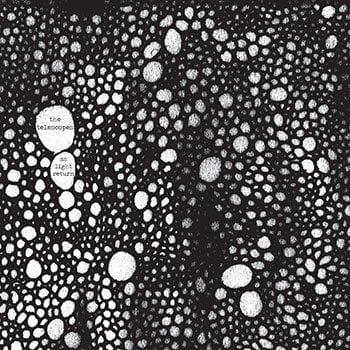
From the artwork to the titles to the music, almost everything about As Light Return produces a disorienting effect. It begins with the arguably ungrammatical subject-verb disagreement in the title. Then one notices the album’s song titles are themselves a curiosity. There are five of them, and two entirely different songs are called, respectively, “Hand Full of Ashes” and “Handful of Ashes”. Another one is unnervingly called “Something in My Brain”. The cover art resembles the kind of visual representation that appears in cosmology essays to help conceptualize multiple universes in which all matter is trapped in quilted pockets in an infinitely recursive matrix.
None of this confounding but intriguing imagery and nomenclature helps to prepare the listener for the absolute weirdness of the actual music enclosed on As Light Return. The band’s hazy history provides a somewhat helpful context for partially understanding it. The Telescopes were formed in 1987 and alongside such Creation Records labelmates as Ride and My Bloody Valentine experienced moderate commercial success in the shoegaze and noise rock style. Having cycled through dozens of members and gone dormant periodically for long periods of time, the band has since evolved into essentially a solo project led by Stephen Lawrie. Their previous album Hidden Fields (2015) buried wisps of melody in sheets of guitar feedback, five challenging and unpalatable songs that in true shoegaze style, given time and a certain patient cast of mind, largely reveal themselves to the listener like a distant object’s transposition out of fog.
As Light Return is also true to their shoegaze roots and is also a natural progression from Hidden Fields. In short, the band have progressed from a merely experimental and menacing aesthetic with concealed moments of drama and sensitivity towards one that abandons almost all conventions that we associate with popular songwriting, including melodies, simple tonality, and rhythm and syncopation. The result is that it is truly difficult to find the humanity in As Light Return. There are vocal lines in “You Can’t Reach What You Hunger” and “Something In My Brain”, for example, although it would be inaccurate to call them vocal melodies. They are more liked plaintive and haunted recitations interred in the mix. “Down on Me” and “Hand Full of Ashes” feature a kind of steady rhythmic backbeat. But it is more like a faint pulse; it does not function as adornment or support for the musical timbre.
All these of terms and concepts — melody, syncopation, timbre — seem beside the point. As Light Return is far from any musical milieu where such concepts have meaning, and eventually, even calling the word “music” itself to mind will feel inapposite. This is more like immersion in a claustrophobic system of impersonal, solitary, and mechanical passageways, five of them exactly, closed in by the humming, buzzing, droning cadence of guitar feedback and electronic machinery. The most uncompromising realization of this vision is “Handful of Ashes”, an almost 14-minute whirring mechanical loop, like a pulsar beaming radiant energy at regular intervals.
So although Lawrie’s unwavering commitment costs him something — this is pretty much as alone as music gets — there is something admirable in the statement, and even in the content of the album itself. The Telescopes have in the past recalled the Velvet Underground with their artful use of noise, but As Light Return is spiritually closer to Lou Reed’s Metal Machine Music (1975). Reed designed that album to be as obnoxious as possible. But beyond some of the off-kilter characteristics of As Light Return, there is a tranquillity to it, a mournful mood that is totally uniform throughout, like a white noise soundtrack engineered to help tinnitus sufferers drown out the ringing in their ears. Maybe that is the point — a strange balm for the agitated masses besieged by constant sound — I cannot be sure. As Light Return is an unlovable oddity worth hearing.


![Call for Papers: All Things Reconsidered [MUSIC] May-August 2024](https://www.popmatters.com/wp-content/uploads/2024/04/all-things-reconsidered-call-music-may-2024-720x380.jpg)



